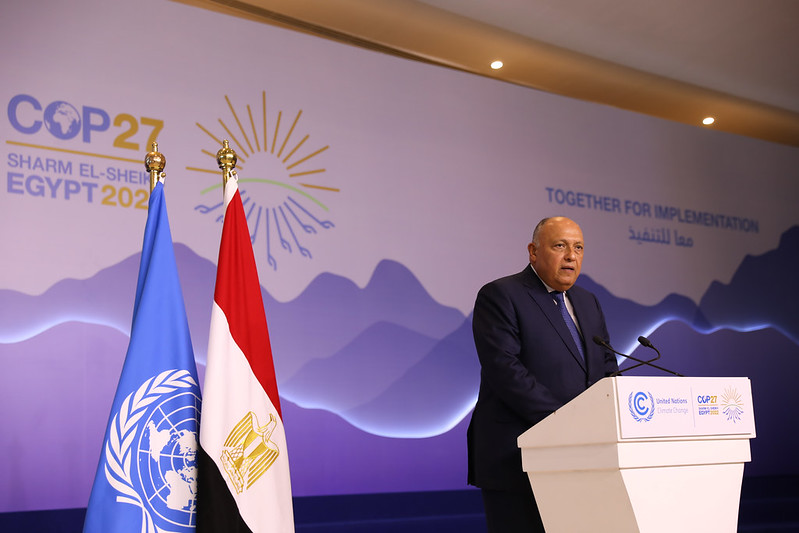World leaders gathered in Egypt from 6-18 November for the COP27 climate conference, where a number of sessions and dialogues were held to discuss the intersection of agriculture and climate change, among other topics. A number of commitments and initiatives were also announced during the talks. These are outlined below.
Koronivia Joint Work for Agriculture (KJWA): KJWA is the official UNFCCC workstream for agriculture and food security, with the goal of discussing and building consensus around six themes: soils, nutrient use, water, livestock, methods for assessing adaptation, and the socio-economic and food security dimensions of climate change across the agricultural sectors. Agriculture was the only sector to have its own negotiations track within the UNFCCC and at COP27, parties agreed to renew the work programme for another four years and launch an online portal for countries to share information.
Sharm El-Sheikh Adaptation Agenda: The COP27 Presidency launched the Sharm El-Sheikh Adaptation Agenda to rally global action around 30 Adaptation Outcomes that are needed to address the adaptation gap and achieve a resilient world by 2030. Each of the 30 Outcomes includes global solutions that can be adopted locally to respond to the increasing impacts of climate change. Outcomes include transitioning to climate-resilient, sustainable agriculture, installing early warning systems, protecting and restoring 400 million hectares in critical areas, and more.
Mitigation work programme: Parties at COP27 finalised the details of a work programme which will run until 2026 with probable extension, to ‘urgently scale up mitigation ambition and implementation in this critical decade.’ Part of the Glasgow Climate Pact, the draft text focused on scaling up efforts in four sectors: energy; industrial processes; agriculture, forestry and land use; and waste.
COP27 “Loss and damage” fund: The two-week climate talks came to a close with a deal signed to create a climate finance fund. Colloquially known as the ‘loss and damage fund’, governments agreed to establish a dedicated fund to assist developing countries in responding to loss and damage from the impacts of climate change. Governments also agreed to set up a ‘transitional committee’ to recommend how the fund should operate by COP28 next year. UN Climate Change Executive Secretary Simon Stiell said, “We have determined a way forward on a decades-long conversation on funding for loss and damage – deliberating over how we address the impacts on communities whose lives and livelihoods have been ruined by the very worst impacts of climate change.”
Agriculture Innovation Mission for Climate (AIM4C): AIM4C was launched in 2021 but announced commitments at COP27 for $7 billion of investments from 42 governments and $1 billion in innovation initiatives aimed at smallholder farmers in developing economies, as well as new technologies and research. Led by the United States and the United Arab Emirates, the initiative was set up to help agriculture adapt to climate change and reduce emissions through innovations.
COP27 FAST initiative: The Food and Agriculture for Sustainable Transformation (FAST) Initiative was launched on Adaptation and Agriculture Day. A multi-stakeholder cooperation programme with annual meetings set to take place, FAO will facilitate FAST and has a number of concrete aims for the coming years. It will seek to improve climate finance contributions to transform agriculture and food systems by 2030 and maintain a 1.5-degree pathway while supporting both food and economic security.
Agri-food systems roadmap: FAO announced its aim to publish a roadmap for agri-food systems in time for COP28 next year. The announcement came after an $18 trillion coalition of investors, led by the FAIRR Initiative – and with support from global figures such as Ban Ki-Moon and Christiana Figueres – had been calling on FAO to set up a roadmap showing how the food sector can meet the 1.5-degree targets and become more climate-resilient. The commitment was made by Zitouni Ould-Dada, Deputy Director of FAO at a side event hosted by FAIRR.
Pavilions and thematic days: A number of thematic days were held at COP27. Adaptation and Agriculture Day, for example, took place on 12 November and saw a number of sessions held on adaptation and resilience in the agriculture sector. The first official Food and Agriculture Pavilion was hosted by the UN Food and Agriculture Organization (FAO), CGIAR and The Rockefeller Foundation, as well as the first-ever Food Systems Pavilion, co-hosted by Clim-Eat, Coalition of Action for Soil Health (CA4SH), EIT Food, Environmental Defense Fund, FOLU, Good Food Institute, Infarm, SNV and Yara International.
Photo: UNFCCC. COP27 President Sameh Shoukry at the climate talks, 19 November 2022.



